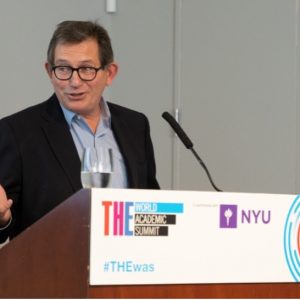Students, researchers and community members alike are expecting higher education leadership to raise their ambition around climate action and demonstrate how their education, research and campus operations are setting a positive example of climate leadership in their communities and beyond. On Tuesday the 11th October 2022, the Climate Alliance hosted a panel event as part of the Times Higher Education World Academic Summit and shared approaches available to university leadership from around the world in strengthening their universities commitment to climate action.
Professor Matthew England
Climate Alliance Global Academic lead, Professor Matthew England moderated the event and spoke about why international partnerships were identified as serving a critical role in responding to climate change. “The Climate Alliance was established by UNSW Sydney, in the same year as the university achieved net zero operational emissions and will manage the secretariat of the Climate Alliance until 2025, when it is committed to achieve full divestment from fossil fuels. These achievements really speak to the opportunities for universities to lead by example.” Scientia Professor Matthew England
Emeritus Professor Ian Jacobs
Former President and Vice-Chancellor of UNSW Sydney, Emeritus Professor Ian Jacobs, who established the Alliance, highlighted the successes the program has achieved to date, including one of the largest university-led climate declarations in history, “We undertook this initiative because the science tells us, unequivocally, that climate change is an existential threat and because of a passionate belief – held by all our Climate Alliance partners – that the deep knowledge and skills we hold in our universities can offer the world solutions.”
President and Vice-Chancellor Professor Rocky Tuan
President and Vice-Chancellor Professor Rocky Tuan from the Chinese University of Hong Kong (CUHK) is a world-renowned biomedical scientist specializing in regenerative medicine and the key driver behind the university’s climate action and net zero plan. He spoke on why CUHK decided to establish the world’s first museum of climate change, inaugurated on the campus, almost nine years ago. “When people leave our museum we want them to take away a simple message: we did not inherit the Earth from our ancestors, we have borrowed it from our children. If they just remember that, then instinctively they will support the Sustainable Development Goals and in particular climate change action”.
Dr Joanna Newman
Dr Joanna Newman, Chief Executive and Secretary General of the Association of Commonwealth Universities (ACU), argued that the threats to our planet call for a global knowledge ecosystem, steered by universities and drawing on the expertise of diverse nations, cultures and communities. As the world’s first and largest university network, the ACU’s 500 member universities include many on the frontline of climate change worldwide. Dr Newman described how the organisation plays an important role in bringing them together to share knowledge and experience, as well as supporting and strengthening the capacity of universities everywhere to deliver vital climate change research and shape public policy in the area.
Cecil Scheib, Chief Sustainability Officer of New York University
Cecil Scheib, Chief Sustainability Officer of New York University, one of the largest private universities in the United States, also joined the panel. Cecil introduced the important role of campus initiatives, “Every choice we make can contribute to making the world a little better, and universities can contribute to this”. Cecil shared some examples that have led New York University to reduce carbon emissions by 30% over five years and how the university is now extending their work to the broader community to guide a 50% carbon reduction by 2025 across New York city.
Jacqueline Moy
Jacqueline Moy is in her final year at New York University and delivered an opening keynote address with a personal story on how climate education ultimately changed the course of her career, encouraging her to refocus on protecting the environment.
Jacqueline also shared the work of the Climate Alliance’s student community during Earth Day this year. The Climate Alliance invited 800 students and changemakers to share their ideas about what they would like to see from our universities to accelerate climate action. The Climate Alliance Student leaders identified five areas of focus:
- Incorporating climate literacy into educational curricula.
- Support students to have more meaningful representation in decision making at all levels of community and university forums.
- Support public awareness campaigns to encourage investment in protecting our most vulnerable communities against climate impacts.
- Incorporate the arts and innovation into the climate conversation to help inspire and empower students into how they can bring climate education to the wider community.
Expand the role of campuses in raising awareness and fostering a love of nature.
This statement is an invitation to our university community to start a conversation and share their ideas on how we might reimagine our role as community leaders on climate, to inspire the next generation toward a more vibrant, sustainable future. Read the full student statement here
Climate Alliance Secretariat
Administered by UNSW Sydney
International Universities Climate Alliance
universitiesforclimate@unsw.edu.au
The International Universities Climate Alliance brings together leading climate research universities, united in their dedication to help communities capacity build and accelerate climate transition at a global scale.






